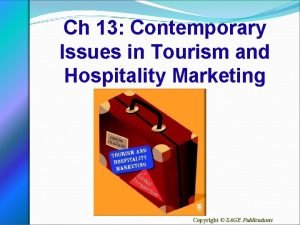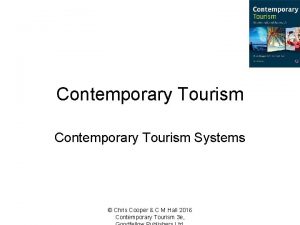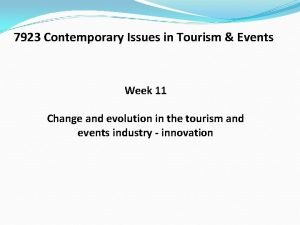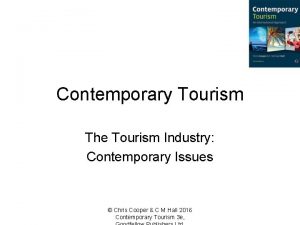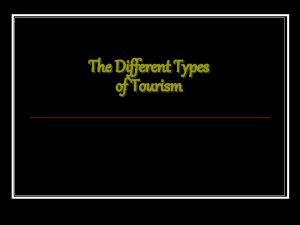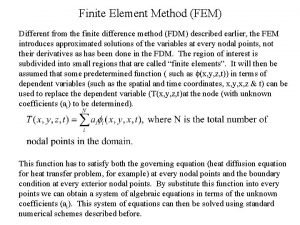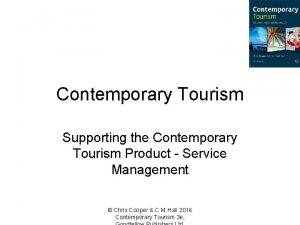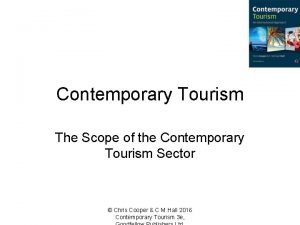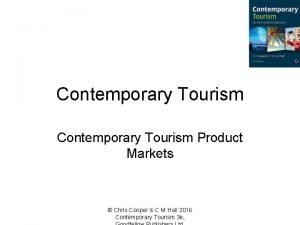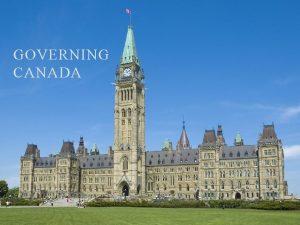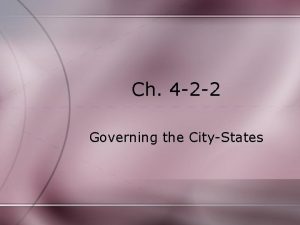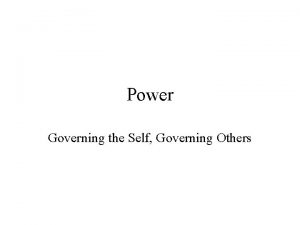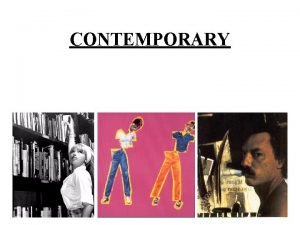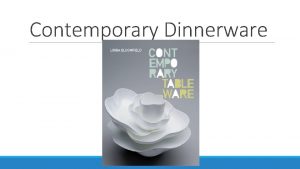Contemporary Tourism Governing the Contemporary Tourism Product Chris
















- Slides: 16

Contemporary Tourism Governing the Contemporary Tourism Product © Chris Cooper & C M Hall 2016 Contemporary Tourism 3 e,

Lecture Objectives • Understand the development of the concept of governance and its key characteristics • Understand the reorganisation of the state • Recognise the importance of multi-level governance, particularly in policy areas that have become highly globalised • Appreciate the complexity of governance in contemporary tourism • Understand the major roles of government in contemporary tourism • Identify different types of tourism policy © Chris Cooper & C M Hall 2016 Contemporary Tourism 3 e,

Governance • Designing and implementing public policy and strategy for tourism • Coordination of government, private sector and non-government actors • All scales • Shift from government to governance • Nation state is important in tourism © Chris Cooper & C M Hall 2016 Contemporary Tourism 3 e,

Governance in Tourism • Governance as the act of governing • A major concern to stakeholders in tourism • The design, implementation and monitoring of public policies and strategies with respect to how the state intervenes in tourism – Corporate governance is related to but separate from state governance © Chris Cooper & C M Hall 2016 Contemporary Tourism 3 e,

Government to Governance • Role of government and the state has changed in many economically developed countries • Complex elements of governance • Role of State – Sub national (local state) – Supra-national organizations (e. g. EU) – Trans-territorial organizations (cross-border) • State remains important. State has power to © Chris Cooper & C M Hall 2016 change how it governs. Contemporary Tourism 3 e,

Elements of Contemporary Governance • change in political practices involving, amongst other things: – increasing globalisation – the rise of networks that cross the public-private divide – the marketization and corporatisation of the state – increasing institutional fragmentation © Chris Cooper & C M Hall 2016 Contemporary Tourism 3 e,

Scales • Multi-level governance – International – Complex • Policy fields that are internationalized and have “stretched” state governance include – aviation – the environment – human rights – international trade – migration © Chris Cooper & C M Hall 2016 Contemporary Tourism 3 e,

Roles of Governance in Tourism • • Varies by scale Varies by jurisdiction Changes over time Roles – – – – Coordination Planning Regulation Entrepreneurship Stimulation Promotion Chris Cooper & C M Hall 2016 Overall role of© protecting the public interest Contemporary Tourism 3 e,

Types of Regulation • Policy types: – Regulatory – Self regulatory – Distributive – Re-distributive © Chris Cooper & C M Hall 2016 Contemporary Tourism 3 e,

Partnerships • Partnerships designed to‘steer’ policy • Suggests no single actor can solve issues in tourism • Cross sector • Potentially allows participation © Chris Cooper & C M Hall 2016 Contemporary Tourism 3 e,

Benefits of Collaboration • • • Broad analysis improves the quality of solutions Response capacity is more diversified Useful for reopening deadlocked negotiations Risk of impasse is minimised Process ensures that each stakeholder’s interests are considered in any agreement Parties retain ownership of the solution Parties most familiar with the problem find solutions Participation enhances acceptance of solution and willingness to implement it Potential to develop cost-effective innovative © Chris Cooper & C M Hall 2016 solutions Contemporary Tourism 3 e,

Partnership structures • Critical to the collaborative process is the opportunity and capacity to participate. • Genuine partnership in tourism therefore may not mean the end of politics but instead providing a structure by which the full range of opinions and perspectives of those impacted by tourism can be heard and addressed © Chris Cooper & C M Hall 2016 Contemporary Tourism 3 e,

Implementation Issues of Tourism Policy • Represent compromises between conflicting values of stakeholders. – Between key stakeholders and interests within the policy development and implementation structure. – Between key stakeholders and interests upon whom implementation will have an impact. • Framed without attention being given to the way in which underlying forces (particularly economic ones) and policy decisions outside of tourism will affect them. © Chris Cooper & C M Hall 2016 Contemporary Tourism 3 e,

Metagovernance • A counter process to the tendencies of the “withdrawal” of the state from governance, whereby political authorities at national and other levels are more involved in organising the self-organisation of partnerships, networks and governance regimes • The governance of governance © Chris Cooper & C M Hall 2016 Contemporary Tourism 3 e,

The Governance of Tourism Governance • Many studies of governance in tourism have tended to focus on the techniques or methods of governance rather than the values that may underlie the selection of particular interventions. • What values or political philosophies lead to the selection of a particular policy intervention and what was the range of choices? © Chris Cooper & C M Hall 2016 Contemporary Tourism 3 e,

Recommended Reading • Hall, C. M. (2008). Tourism Planning, 2 nd ed. Harlow: Prentice-Hall. • Jenkins, J. M. , Hall, C. M. & Mkono, M. (2014). Tourism and public policy: Contemporary debates and future directions. In A. Lew, C. M. Hall & A. Williams (eds. ) The Wiley Blackwell Companion to Tourism, pp. 542 -555. Oxford: Wiley-Blackwell. • Journal of Sustainable Tourism, 2011, Volume 19 (numbers 4 -5) (special issue on governance). © Chris Cooper & C M Hall 2016 Contemporary Tourism 3 e,
 Chris cooper mechanical
Chris cooper mechanical Contemporary issues in tourism and hospitality
Contemporary issues in tourism and hospitality Contemporary tourism definition
Contemporary tourism definition Contemporary tourism meaning
Contemporary tourism meaning Contemporary issues in tourism
Contemporary issues in tourism Contemporary tourism issues
Contemporary tourism issues Mass tourism vs alternative tourism
Mass tourism vs alternative tourism Bypass governing of steam turbine
Bypass governing of steam turbine Governing ourselves
Governing ourselves Governing equation heat transfer
Governing equation heat transfer Governing bodys
Governing bodys Decs order no. 11, s. 1987
Decs order no. 11, s. 1987 Governing body of insurance council
Governing body of insurance council Inquiry elevates your thinking power
Inquiry elevates your thinking power How do national governing bodies promote sport
How do national governing bodies promote sport Sgc school
Sgc school Weather equations
Weather equations

